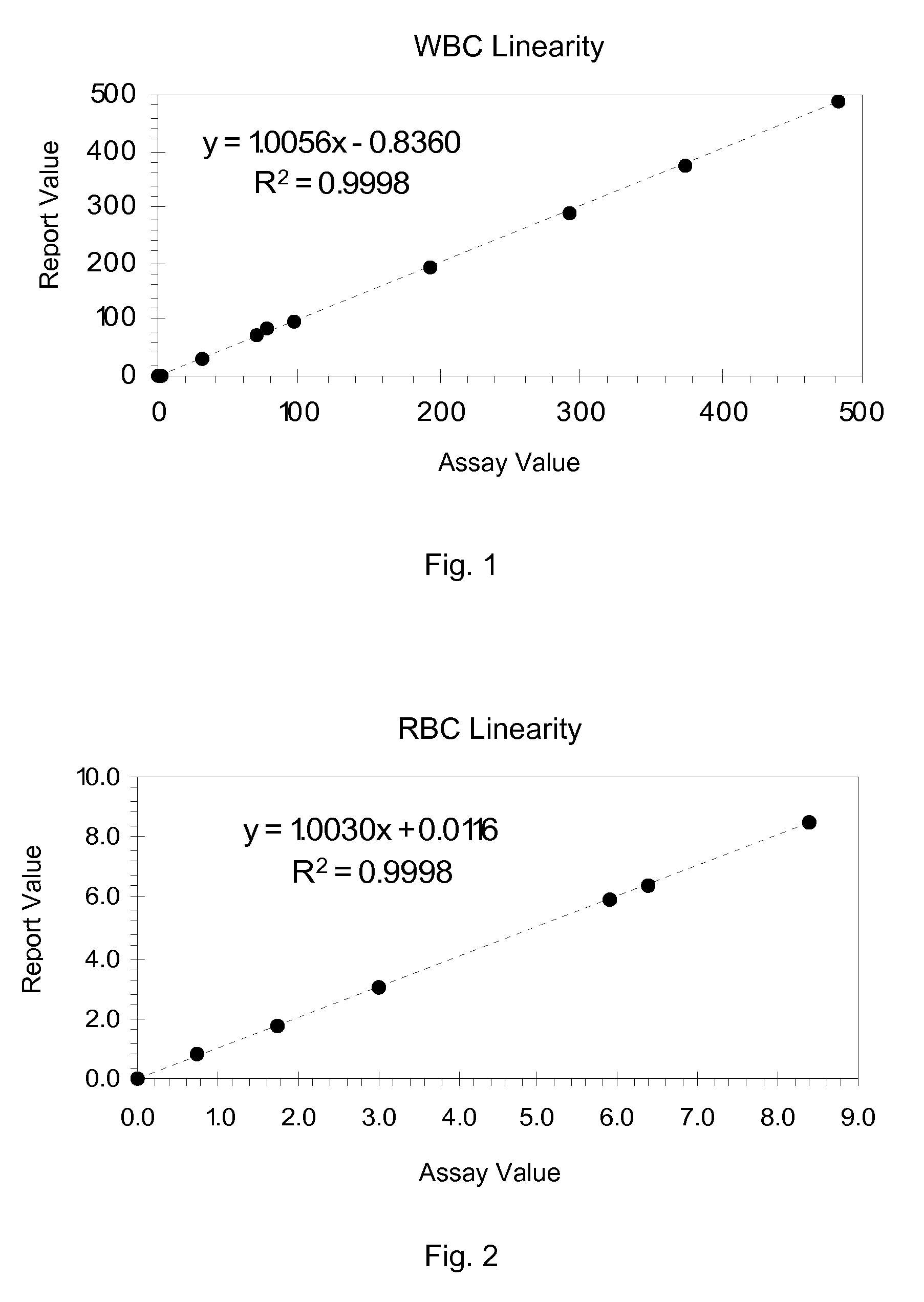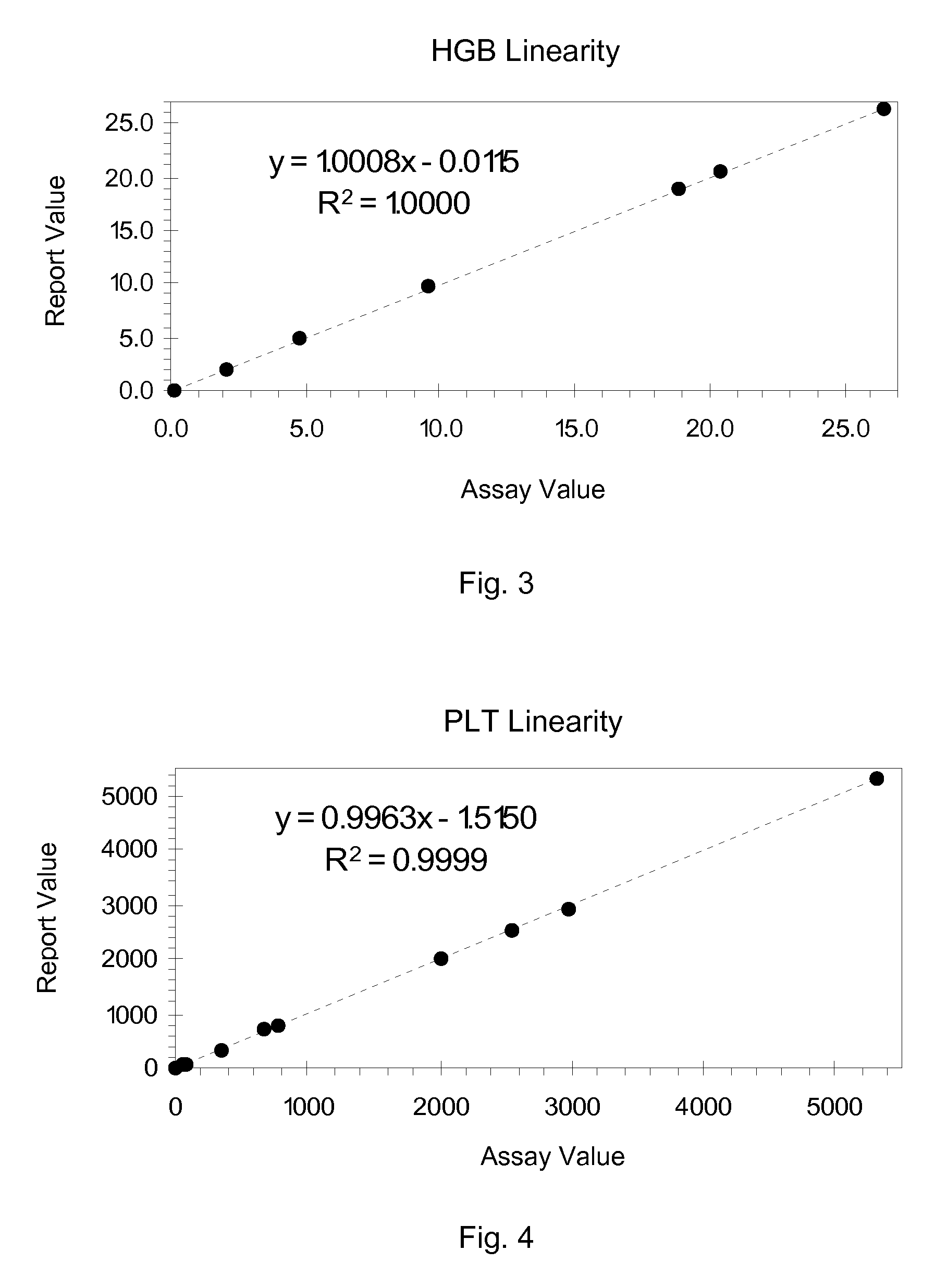Hematology Linearity Control Composition, System and Method of Use
a linearity control and linearity technology, applied in the field of linearity reference control composition and linearity control system, can solve the problems of increasing the concentration of components, time-consuming and laborious, and the use of single component linearity control for determining the linearity of measurement of several hematology parameters, etc., to achieve the effect of reducing the concentration of stabilized red blood cells, reducing and increasing the number of total particle coun
- Summary
- Abstract
- Description
- Claims
- Application Information
AI Technical Summary
Benefits of technology
Problems solved by technology
Method used
Image
Examples
example 1
White Blood Cell Analogs Made of Goose Red Blood Cells
[0089]The following is one example of preferred reagents and recommended specific procedural steps for treating geese red blood cells to obtain the white blood cell analog for the linear control composition. It is understood that the formulations and the procedures are only illustrative and that other ingredients, proportions and procedures may be employed, in accordance with the disclosures in this invention.
[0090](1) Anticoagulants for Collection of Whole Blood
[0091]One or more of the following anticoagulants can be used in a suitable quantity, as determined by one skilled in the art.
[0092](a) Standard ACD (acid-citrate-dextrose)
[0093](b) Standard CPD (citrate-phosphate-dextrose)
[0094](c) Disodium EDTA (ethylenediamine tetraacetate), 2 mg / ml of blood.
[0095](2) Goose Erythrocyte Washing and Diluting Solution
Goose Erythrocyte Washing and Diluting Solution (GEWDS)ComponentAmount (g / l)Sodium phosphate monobasic1.31gSodium phosphate...
example 2
White Blood Cell Analog Made of Avian Red Blood Cells
[0105]The following is a specific example of preferred reagents and recommended procedural steps for treating goose red blood cells to obtain a normal sized lymphocyte analog. The white blood cell analogs made using this method can be used as lymphocyte analogs using VCS measurement, and they are used as the white blood cell analogs for the linearity control composition of the present invention. It will be understood that the formulations and the procedures only are illustrative and that other ingredients, proportions and procedures can be employed, in accordance with the disclosures in this invention.
Lymphocyte Hypotonic SolutionComponentAmount (g / l)Sodium phosphate monobasic0.2 gSodium phosphate dibasic 7H2O2.0 gq.s. to 1 liter with distilled waterpH approximately 7.8Osmolality 15 to 25 mOsm / kg H2O
[0106]White blood cell analog preparation procedure
[0107]1. Select goose red blood cells having a mean cell volume range of about 140...
example 3
Method of Making a Platelet Analog
[0113]Platelet Analog Preparation Procedure
[0114]1. Obtain fresh goat whole blood with an MCV of 12 to 16 fl.
[0115]2. Wash the red blood cells with a phosphate buffered saline to remove unwanted cellular components, such as white blood cells, platelets, plasma, and plasma proteins.
[0116]3. The washed goat red blood cells are suspended in Suspension Medium 2 of Example 4 at a known cell count.
PUM
| Property | Measurement | Unit |
|---|---|---|
| mixing time | aaaaa | aaaaa |
| time | aaaaa | aaaaa |
| time | aaaaa | aaaaa |
Abstract
Description
Claims
Application Information
 Login to View More
Login to View More - R&D
- Intellectual Property
- Life Sciences
- Materials
- Tech Scout
- Unparalleled Data Quality
- Higher Quality Content
- 60% Fewer Hallucinations
Browse by: Latest US Patents, China's latest patents, Technical Efficacy Thesaurus, Application Domain, Technology Topic, Popular Technical Reports.
© 2025 PatSnap. All rights reserved.Legal|Privacy policy|Modern Slavery Act Transparency Statement|Sitemap|About US| Contact US: help@patsnap.com


